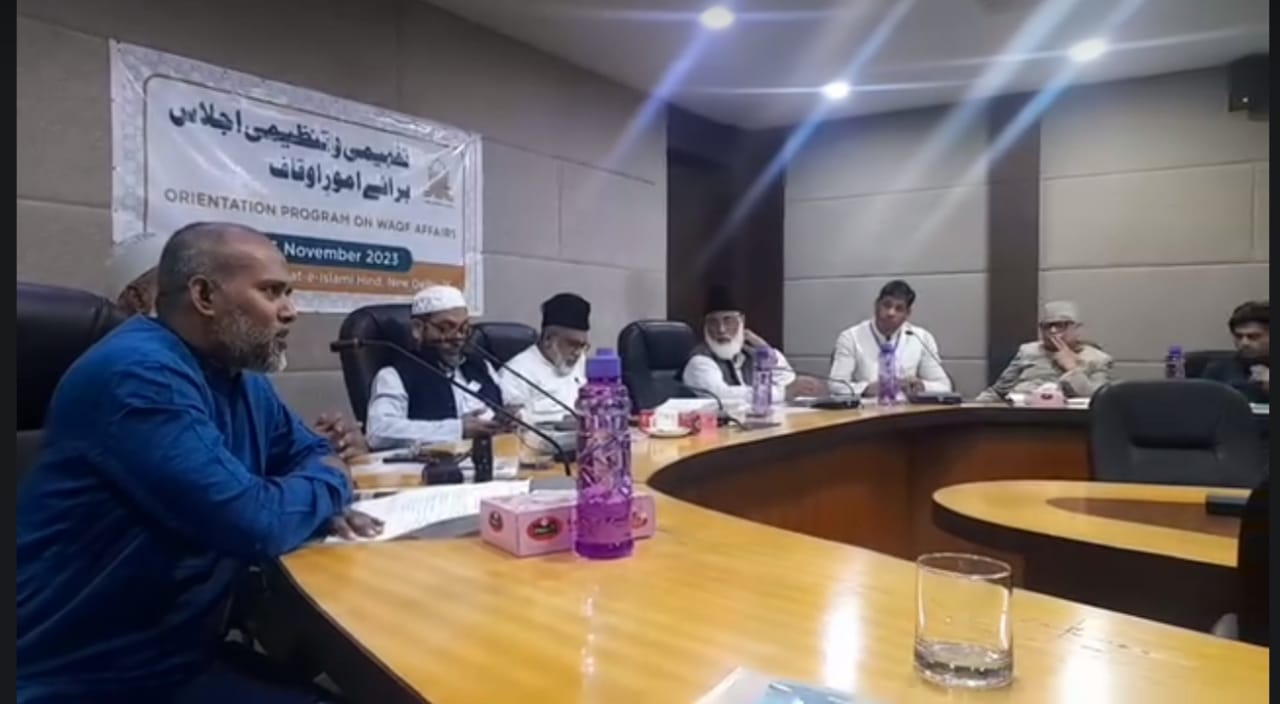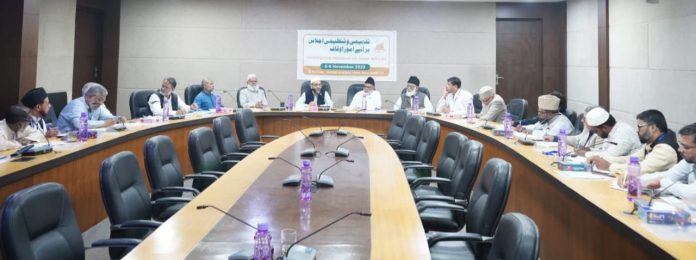By Anwarulhaq Baig
New Delhi, Nov.11, 2023
An important meeting on Waqf hosted by Jamaat-e-Islami Hind (JIH) here has brought attention to severe challenges including corruption, mismanagement, encroachment, and the government’s intention to acquire its properties, faced by Islamic endowment institution, which holds the largest landholding in India after defence and railways.
 The two-day awareness-raising meeting on waqf, attended by JIH state officials from waqf departments across the country, discussed a wide range of issues related to Islamic endowment, including the current status of waqf in India, the protection of waqf property, the revival of waqf institutions, and the recovery of encroached waqf properties.
The two-day awareness-raising meeting on waqf, attended by JIH state officials from waqf departments across the country, discussed a wide range of issues related to Islamic endowment, including the current status of waqf in India, the protection of waqf property, the revival of waqf institutions, and the recovery of encroached waqf properties.
A waqf, also known as ḥabs or mortmain property, is an enduring charitable endowment in the Islamic law, in which the ownership of a property is transferred to Allah and the movable or immovable properties are permanently dedicated for religious or charitable purposes. Philanthropists donate assets like buildings, plots of land, or other resources for Muslim religious or charitable causes. In India, the Central Waqf Council was established by the government under the Waqf Act, for advising it on matters concerning state Waqf Boards and the proper administration of waqfs.
Former and present government officials, lawyers, and scholars, including Syed Mahmood Akhtar (former director, Ministry of Minority Affairs, Government of India), Dr. Zafar Mahmood (president, Zakat Foundation of India), Akram Aljabar (former income tax commissioner, Maharashtra), Mohammad Afzalul Haq (assistant law officer, Central Waqf Council), Hasib Ahmed (former joint secretary, Ministry of Education), along with veteran bureaucrats Advocate Mohammad Islam and Advocate Raees Siddiqui, shared their valuable insights on several aspects of waqf.
In his keynote address, JIH President Syed Sadatullah Husaini emphasized that while waqf, a crucial institution in Islam, is often viewed solely from a beneficial perspective, it is also a fundamental pillar of the entire economic concept and the Islamic economic system. He said, “wealthy individuals used to dedicate their property for the fulfilment of a specific need of society.”
Depicting the precarious state of waqf properties in India, the JIH president pointed out that although India possessed the largest number of waqf properties globally, about 70 to 80% of all waqfs were beyond the control of the Waqf Board, while the remaining 20 to 30%, under the Waqf Board were prone to poor governance and corruption.
Calling preservation, revival, and restoration of waqf institutions a national obligation, he stressed the need for a concerted effort encompassing various aspects, including raising awareness, monitoring government actions, judicial proceedings, and media discourse, and working towards activating state Waqf Boards.
Elaborating on the Islamic Shariah status of waqf, JIH national secretary Dr. Mohammad Raziul Islam Nadwi emphasized that waqf represents a unique form of social service, firmly rooted in the Quran and Hadith. “The tradition of waqf originated during the time of Prophet Muhammad ﷺ, and throughout history, Muslim rulers and affluent individuals across diverse eras and regions have generously dedicated significant properties to waqf,” he added.
He noted that it is imperative to continue using a waqf property perpetually for the purpose for which it was specifically dedicated by a person.
To harness the true potential of waqf properties for the betterment of society, JIH Secretary Dr. Mohiuddin Ghazi urged the community to mirror the unwavering commitment that led to the dedication of these properties, extending that same dedication to their preservation and management.
JIH Vice Presidents, Prof. Mohammad Salim Engineer and Mr. Malik Moatasim Khan also spoke on the occasion. Secretary of the JIH Waqf Department, Mohammad Rafiq and JIH Assistant Secretary Inamur Rahman worked diligently to make the event successful.
Distinguished speakers provided in-depth discussions on the current state of Waqf, the preservation of Waqf, practical measures, Waqf laws, Waqf surveys, and the provision of information related to it. During the meeting, efforts were made to explore solutions to challenges and difficulties related to Waqf properties in India. It was emphasized that Waqf should be treated as a movement, and the primary issue is encroachment, with the real ownership belonging to the Muslim community. Concerns were also raised regarding the government’s apparent intentions to acquire waqf properties, given that Waqf Boards are the country’s third largest landowners. To address it, a call was made to use the Right to Information Act for investigating and understanding the current situation. On this occasion, RTI activist and former JIH Assistant Secretary Intizar Naeem’s efforts were acknowledged in this regard.
State Waqf Boards were established by State Governments as per the Waqf Act, 1954, for the purpose of managing and safeguarding Waqf properties. They form District and Regional Waqf Committees, overseeing individual Waqf Institutions. These boards, as corporate bodies, have perpetual succession and powers to acquire property. Currently, there are 30 Waqf Boards across 28 states and Union Territories in India.
According to a 2011 report by Justice Shashvat Kumar, the nationwide value of Waqf properties is `1.2 lakh crore, with a potential annual return of `12,000 crores. However, mismanagement has resulted in only `163 crores in returns. The report highlighted a shortage of qualified Muslim officers to manage waqf affairs, suggesting the need for a dedicated cadre. Both central and state Waqf Boards have faced issues of corruption, land encroachment, and fund misappropriation.




